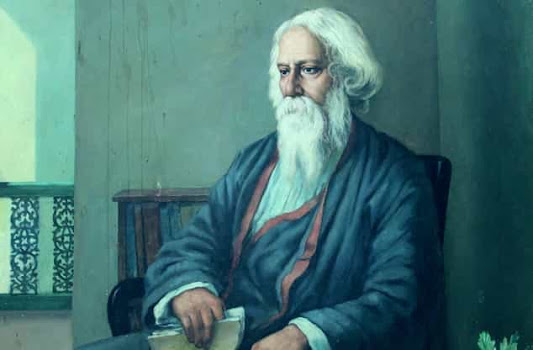Essay on Rabindranath Tagore
Introduction
 f
fRabindranath Tagore, who is also called Gurudev, Kalbguru or Biswakobi, was a legendary Bengali poet, composer, philosopher and also a patriot. Rabindranath Tagore was awarded the Nobel Prize In 1913, for "Gitanjali". He was the first non-European winner of the Nobel Prize in Literature. Rabindranath Tagore played a leading role Indian cultural renaissance and reshaped Bengali literature, music, and art. His birthday is celebrated as Rabind Jayanti.
Early Life of
Rabindranath Tagore
Rabindranath Tagore was born on 7 May, 1861 in a
wealthy Brahmin family at Jorasanko in Calcutta (Kolkata).He was the youngest
son of Maharshi Debendranath Tagore and Sarada Devi. After his mother death, he
was raised by their servants. Rabindranath Tagore’ nickname was Rabi. Rabi
started his study at Oriental Seminary School but he did not like to go to school
so he was educated at home from several teachers. When he was only eight years
old, he started writing poems and when he was sixteen, he started publishing
his work under the pseudonym “Bhanusingha”. After his study at home, Rabindranath
Tagore went to England in 1878 to become a barrister and enrolled at a public school
in Brighton, East Sussex. In England, Rabindranath Tagore briefly read law at University
College London but drop this and he learnt English, Scottish, Irish literature
and music. In 1880, Rabindranath Tagore came back India without degree. In
1883, Rabindranath Tagore married Mrinalini Devi. They had five children.
Rabindranath
Tagore and his Literary Works
In 1890, Rabindranath
Tagore went to Shelaidaha with his family to manage his vast ancestral estates.
There, he came closer to the nature, the villegers, Padma River that influenced
him to write many poem, story and song. He stayed 10 years and published several
poetry such as Sonar Tari, Kanika, Kalpana, Mansi, Chitra etc. From 1891 to
1895, Rabindranath Tagore wrote three volume collection of 84 short stories,
named Golpoguchcho.
Rabindranath Tagore wrote his first drama Valmiki
Pratibha at the age of 20. In 1912, he wrote Dak Ghar. In 1890, he wrote
Visarjan which is regarded as his finest drama.
Rabindranath Tagore’s first short story was Bhikharini written in 1877. His written short stories are Kabuliwala, Balai, Postmaster, Guptodhan, Atithi etc. Rabindranath Tagore wrote many novels such as Naukadubi, Chaturanga, Ghare Baire, Jogajog, Chokher Bali etc. His written novel Gora is his best creation. Rabindranath Tagore was awarded the Nobel Prize in 1913 for "Gitanjali" which is the most famous collection of poetry. His other children’s poetry are Shishu, Shishu Bholanath.
Rabindranath Tagore wrote several essays, letters as well as travel
books such as Swadesh, Jeebonsmriti, Bhanusingher Patrabali, Japan Jatri etc.
Rabindranath
Tagore wrote 2230 song, 50 dramas, and 13 novels. His songs are reffered to as “Rabindrasangget”
Rabindranath
Tagore and Shantiniketan
In 1863, Rabindranath Tagore’s father Debendranath
Tagore bought 20 acres of land in Bolpur of Birbhum district in West Bengal.
There he built an Ashram, named
Shantiniketan, now is called “Chatim tala”. In 1901, Rabindranath Tagore established
a Brahmacharyashram. It was a prayer hall and was named The Mandir but later it
came to be known as Patha Bhavana. The school was started with five students
and followed the previously existing system of gurukul. On 23 December, 1921
Viswa-Bharati was founded by Rabindranath Tagore that was declared to be a
central university.
Rabindranath
Tagore’s patriotism
Rabindranath Tagore was a true patriot. He was against
British Rule. Rabindranath Tagore protested against the “Partition of Bengal”
by British viceroy Lord Curzon. He urged the Hindu and Muslim to tie “Rakhi” to
each other’s to show the unity and brotherhood and also protest the “Partition
of Bengal”. In 1915, Rabindranath
Tagore was awarded a knighthood by King George V but he renounced it to show
his protest against the 1919 Jalianwala Bagh Massacre.
Conclusion
On 7 August 1941, at the age of 80, Rabindranath
Tagore was died in the Jorasanko Thakur Bari (Jorasanko mansion). Rabindranath
Tagore is the pride of India and all Bengalis. Rabidranath Tagore wrote the
National Anthem of India and Bangladesh.


.jpg)














0 Comentarios:
Post a Comment
Please do not use any abusing words or enter any spam links in the comment box